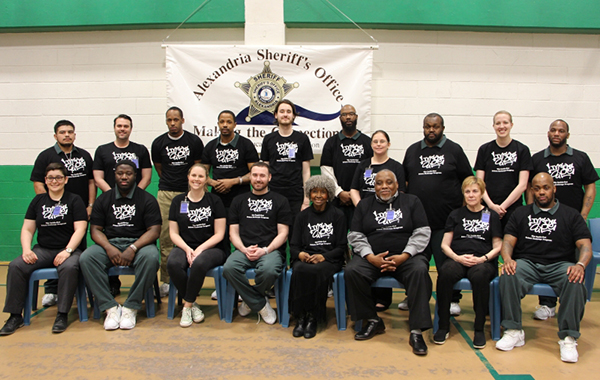
Above: Outside and inside
students from Virginia Theological Seminary and the Alexandria Detention Center
in Virginia participated recently in a program similar to the opportunity
Hendrix students and Wrightsville Correctional Unit inmates will have this fall.
Photo by Alexandria Sheriff’s Office/courtesy Inside-Out Center. Story here.
By Nicola Bryan | Staff Writer | The Hendrix College Profile
In Fall 2019, a criminal justice course will be offered here at
Hendrix, taught by Dr. Jay Barth, M.E. and Ima Graves Peace Distinguished
Professor of Politics. This course differs greatly from other courses offered
at Hendrix, though, as it follows the Inside-Out model.
The Inside-Out model is a type of academic program that seeks to
facilitate education and dialogue across profound social differences. The Inside-Out Prison Exchange Program began
at Temple University in 1997, and has seen much success when implemented at
prison facilities, both nationally and internationally. It calls for an equal
number of inside students (those incarcerated) and outside students
(traditional college students) to make up a class. So, this criminal justice
course will consist of Hendrix students, as well as incarcerated individuals
from the Wrightsville Correctional Unit.
“There’s a great deal of intentionality about community building, and
about bringing down walls between inside and outside students so that they are
working together in the course,” Dr. Barth said.
The class will include traditional papers and readings but primarily
focuses on small and large group discussions, as it is a discussion rather than
lecture-based class. As a discussion-based class, students are forced to
communicate with each other in meaningful ways within the classroom setting.
Dr. Barth became interested in the Inside-Out program after reading James
Forman Jr.’s writing about the criminal justice system and its disparate impact
on African-American communities.
“I had been looking for a way to have some impact, in terms of
bettering the situation of those who are reentering society after being
incarcerated. I was intrigued by the notion of using teaching skills to make a
difference, and I was drawn to this model of engaged learning,” Dr. Barth said.
He received a teaching grant from Hendrix through the Mellon
Foundation. The grant is supposed to help with curricular development work that
is focused on the diversification of curriculum, as well as the diversification
of Hendrix, as the course will give Hendrix students the opportunity to
interact with people that are not normally in their classroom setting. The
grant also allowed Dr. Barth to receive training for the program, which took
place outside of Detroit. During his training, Dr. Barth spent three days in a prison
and was able to see the model play out firsthand.
The training that he underwent prepared him to undertake an Inside-Out
class of his own. The next step was figuring out what prison setting in
Arkansas made the most sense to implement the model in, as there are not many
prisons near Hendrix. The Wrightsville Correctional Unit, just south of Little
Rock, is the closest facility of the appropriate size. The prison features a
men’s facility, as well as a women’s facility.
“What’s nice about that facility is that they do have a lot of
programming already in place. They have good physical space for programming,
which a lot of prison facilities don’t have. They have a relationship with
Shorter College for some higher education work. And they even have Compassion
Works for All, which is a program focused on conflict-resolution, yoga, and
mindfulness. So, it was a good facility to choose for that reason. Although it
is somewhat of a hike to get there,” Dr. Barth said.
The Wrightsville Correctional Unit is a 50-minute drive from Conway.
Hendrix students will travel to the facility one night a week, when the prison
has programming time available. The course will take place in the men’s
facility specifically, which has approximately 1,300 individuals.
“What’s interesting about working in prisons is that things don’t
always happen in a predictable way. If there’s a lockdown for instance, then we
won’t be able to go in. So, we have to stay on our toes and be flexible. And
the cool thing is, two of my other colleagues, Dr. Maslin and Dr. Shanks-Booth,
are also very interested in implementing this model,” Dr. Barth said.
Dr. Kim Maslin, Professor of Politics, and Dr. Delphia Shanks-Booth,
Assistant Professor of Politics, are undergoing training this summer for the Inside-Out
model through a different diversity grant. Dr. Maslin is interested in teaching
a feminist political course in the women’s facility and is also open to
teaching an American political thought course. There are numerous factors to
consider when choosing a course topic for this model, though, such as whether
all students will have the same access to textbooks and materials, and the
prior knowledge that each student will bring to the course. Dr. Maslin is aware
of these factors’ influence, and she looks forward to getting feedback on what
courses will work best.
The original version of this
story appeared in the March 2019 issue of The Profile (Volume 107, Issue 5), the
student news source of Hendrix College. Reproduced with permission.